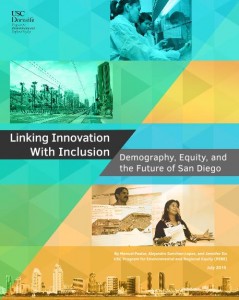 SAN DIEGO – San Diego Housing Federation says the report released today, Linking Innovation with Inclusion: Demography, Equity, and the Future of San Diego, shows “linking people and place” through affordable housing policies moves all of San Diego forward equitably and sustainably.
SAN DIEGO – San Diego Housing Federation says the report released today, Linking Innovation with Inclusion: Demography, Equity, and the Future of San Diego, shows “linking people and place” through affordable housing policies moves all of San Diego forward equitably and sustainably.Conducted by University of Southern California Program for Environmental and Regional Equity, the report highlights how a lack of diverse, equitable communities impacts the region’s long-term economic, environmental and social well-being, and it identifies challenges lower-income San Diegans face – particularly the communities of color, immigrants and youth.
“These data show that, without a college degree, San Diegans are making less than the regional housing wage and even with a college degree, black and Latino workers still make less than the regional housing wage,” says Bruce Reznik, executive director of the San Diego Housing Federation, the region’s leading voice for affordable housing. The regional housing wage is the average income that a person needs to make to spend no more than 30 percent of his/her take-home pay on rent or mortgage, which is nearly $27/hour in San Diego. “San Diego’s economy relies on these hard-working individuals, so we need more affordable and transit-friendly housing to lift all of San Diego.”
In addition to identifying these types of issues that affect the region as a whole, the report provides solutions to the long-term threats, many of which directly relate to affordable housing. This isn’t surprising, says the Housing Federation, as the nonprofit knows that affordable housing is underutilized in San Diego in solving many of the current and projected problems that this report highlights.
The report’s recommendations for a more equitable, sustainable San Diego, include:
- Establishing stable funding sources for affordable housing: Policies such as linkage fees that create resources for affordable housing units to help keep the cost of living balanced throughout the City, ensuring the region’s growth and the future middle class.
- Protecting current residents from displacement: More affluent populations are moving to the urban core, driving lower-income communities to our suburbs that often lack transit and other infrastructure to serve these communities. Forcing these lower income communities away from job centers and into cars results in more congestion, pollution and lost productivity. Policies that are responsive to the needs of existing residents and protect these residents from displacement pressures are vital in combating this trend.
- Focusing on more mixed income communities: By utilizing policies such as inclusionary housing, where housing developers dedicate a certain amount of housing units for low-income residents, ensures more balanced communities.
- Increasing civic engagement among emerging populations: By providing programs at affordable housing communities and involving these residents in the policy decisions that impact their communities, we can help develop leadership and break cycles of poverty.
- Addressing social and economic inequality: The report also has many other recommendations aimed at promoting greater equality, such as investing in education to serve our growing high-tech sector, which are bolstered by having safe, stable and affordable housing.
See the full report here Linking Innovation with Inclusion: Demography, Equity, and the Future of San Diego.











